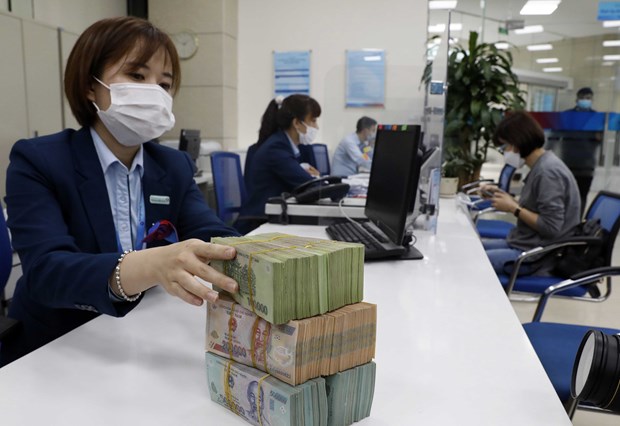More interest rate cuts expected in 3Q2023
Monthly exports and imports continue to fall, while domestic expenditure is expected to stay poor. As a result, more interest rate reduction are not ruled out., according to economists Brian Lee Shun Rong & Chua Hak Bin of Maybank IBG.
The General Statistics Office released a report on the economic and social environment in the second quarter and first half of 2023. According to data, Vietnam's GDP increased for the first time in three quarters (since the fourth quarter of 2022) in construction and manufacturing.

Inflation decreased for the fifth consecutive month in June, mainly due to reduced transportation costs.
In particular, real GDP expanded by 4.14% in the second quarter compared to the same period last year, falling short of the 5% prediction due to lower-than-expected service growth. The economy remains underwhelming, with the second-quarter growth rate being the lowest since 2011 (save for 2020).
Both exports and imports have decreased
According to analysts, some noteworthy characteristics include: industry and construction expanded by 2.5%, with construction leading the way. Increased public investment spending, as well as government initiatives to eliminate legal/regulatory impediments and facilitate the restart of real estate projects, have aided construction.
State investment climbed by 12.6% year on year in the first half of the year, outpacing overall investment growth of 4.7%.
Manufacturing is constant but lower than previous year, owing to poor foreign demand. Electricity and gas use soared as a result of an exceptional heatwave.
Services growth was slower in the second quarter, while real estate fell for the second quarter in a row as developers struggled with funding. Credit growth decreased to 3.4% as of June 15 compared to the end of 2022, much lower than the same period previous year.
Tourism's resurgence continues to enhance service spending. Nominal retail sales declined by 6.5% in June compared to the same month last year, while increasing by 0.5% monthly. Visitors from South Korea, the United States, China, and Taiwan drove the growth in foreign arrivals to 975 thousand in June, representing 49% of the high in January 2020.
However, while the job market remains poor (particularly in export sectors), local people are tightening their belts, hurting income. The number of employees in industrial firms was 4.2% fewer (as of June 1) than in the same time previous year.
Industrial production increased by 2% month on month in June, the quickest in four months, but exports and imports fell for the eighth consecutive month.
Despite this, monthly export growth is the highest since March, owing mostly to a 40% increase in phones and components. However, it is still too early to tell if this is a passing fad or the start of a long-term comeback. According to preliminary figures, exports to China grew, but not sufficiently to overcome declines in other countries.
Lower inflation forecast
Maybank's expert panel continues to drop its CPI projection, citing figures from the General Statistics Office that show a fifth consecutive month of decreased inflation in June, owing mostly to lower transportation expenses.

As a result, the overall inflation projection for 2023 is 2.8% (down from 3.4% before). Due to high gasoline costs, Deflation in the transportation industry may linger into the third quarter and the end of the year. Food and utilities will rise in price.
The economy is weakening, and the 2% VAT cut from July to December this year will lessen pricing pressures, while imported inflation may stay mild in the face of falling commodity prices and a more stable VND exchange rate (when compared to the fourth quarter of 2022).
Due to weaker statistical conversion effects, the inflation prediction for 2024 has been reduced to 3.5% (from 3.9% earlier). Inflation is likely to rise in 2024 as the economy accelerates and inflation-fighting measures such as VAT reduction and lower transportation costs fade.
Will interest rates continue to fall?
Experts predict that GDP will expand by 4% in 2023 and 6% in 2024. However, negative export performance is projected to continue in the second half of the year as global economy slows, with some yearly recovery possible in the fourth quarter of 2023.
Domestic consumption is likely to fall in the next months due to cautious consumer behavior in a deteriorating labor market climate.
Meanwhile, real estate developers may continue to suffer financial constraints from maturing debts (averaging VND 20 trillion per month in the third quarter, up from VND 10 trillion in May), while the capital market remains depressed owing to investors' lack of interest and demand.
Measures to assist real estate, such as loan repayment reduction, put firms under financial hardship and necessitate increased access to finance in order to continue real estate initiatives and ensure a "soft landing," although comprehensive financial stress alleviation is doubtful.
On the plus side, increased public investment and the implementation of anticipated relief measures (e.g., VAT reduction) will help some domestic demand.
When economic headwinds persist and inflation remains below the target level, policy interest rates may be reduced further in the third quarter. Maybank expects the central bank to cut deposit interest rates by an additional 25 basis points over the next three months while maintaining other measures constant.








